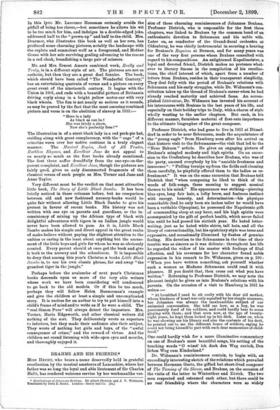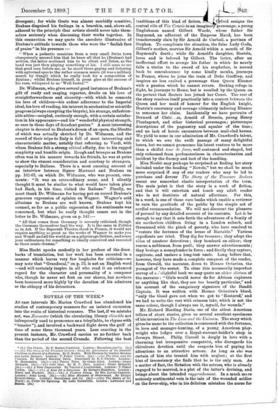BRA_HMS AND HIS FRIENDS.* Miss HECHT, who bears a name
deservedly held in grateful recollection by the musical amateurs of Lancashire, where her father was so long the loyal and able lieutenant of Sir Charles Halle, has rendered welcome service by her workmanlike ver-
* Recollections of Johannes Brahms. By Albert Dietrich and J. V. Widmann. Tranalatod by Dora E. Hecht. London : Seeley and Co. [6s.]
sion of these charming reminiscences of Johannes Brahma. Professor Dietrich, who is responsible for the first three chapters, was linked to Brahma by the common bond of an enthusiastic devotion to Schumann and his noble wife. Later on, as conductor of the Grand-ducal orchestra at Oldenburg, he was chiefly instrumental in securing a hearing for Brahms's Requiem at Bremen, and for many years was one of the very first persons whom Brahma consulted with regard to his compositions. An enlightened Kapellmeister, a loyal and devoted friend, Dietrich makes no pretence what- ever to literary finesse in the compilation of his recollec- tions, the chief interest of which, apart from a number of letters from Brahms, resides in their transparent simplicity.
They deal fully with the period of Brahma's relations with Schumann and his early struggles, while Dr. Widmann's con- tribution takes up the thread of Brahma's career when he had already reached maturity and achieved fame. An accom- plished litteratewr, Dr. Widmann has invested his account of his intercourse with Brahma in the last years of his life, and especially on their holiday trips to Italy, with a charm of style
wholly wanting to the earlier chapters. But each, in his different manner, furnishes material of first-rate importance to the ultimate biographer of the great composer.
Professor Dietrich, who had gone to live in 1851 at Diissel- dorf in order to be near Schumann, made the acquaintance of the "young eagle" from Hamburg soon after his arrival on that historic visit to the Schumanns—the visit that led to the "Neue Bahnen." article. He gives an engaging picture of Brahms's mingled modesty and high spirits. On an excur- sion to the Grafenberg he describes how Brahma, who was of the party, amused everybody by his "amiable freshness and innocence": "Pulling turnips up from the fields and cleaning them carefully, he playfully offered them to the ladies as re- freshment." It was on the same excursion that Brahma told Dietrich that "when composing he liked to think of the words of folk-songs, these seeming to suggest musical themes to his mind." His appearance was striking—piercing blue eyes, long fair hair, a lofty brow, and features instinct with energy, honesty, and determination—his physique remarkable (had he only been six inches taller he would have been a veritable Olympian), he possessed the Napoleonic gift of commanding sleep at any hour, and his high spirits were accompanied by the gift of perfect health, which never failed him until he had passed his sixtieth year. He hated letter- writing, just as he hated white shirts, tall hats, and all the livery of conventionality, but his epistolary style was terse and expressive, and occasionally illumined by flashes of genuine feeling. His devotion to the Schumanns in the time of their trouble was as sincere as it was delicate : throughout her life he regarded the widow of his master with feelings of filial affection, and his reverence for her character found noble expression in his remark to Dr. Widmann, given on p. 190: "When you have written something, ask yourself whether such a woman as Madame Schumann could read it with pleasure. If you doubt that, then cross out what you have written." Returning to Professor Dietrich, we may note the pleasant insight he gives us into Brahma's relations with his parents. On the occasion of a visit to Hamburg in 1861 he writes :—
"At breakfast I used to sit cosily with his dear old mother, whose kindness of heart was only equalled by her simple manners; her Johannes was always the inexhaustible subject of our animated conversation. She told me how, as a boy, he was passionately fond of tin soldiers, and could hardly bear to cease playing with them ; and that even now, at the age of twenty- eight years, he kept them locked up in his desk. Later on, when he was showing me his library and also the contents of his desk, he pointed out to me the different boxes of soldiers, saying he could not bring himself to part with such dear mementoes of child- hood."
One could hardly .wish for a more illuminative commentary on one of Brahma's most beautiful songs, his setting of the touching words "0 wiisst' ich doch den Weg zuriick, Den lieben Weg zum Kinderland."
Dr. Widmann's reminiscences contain, to begin with, an exceedingly interesting sketch of the relations which prevailed between Hermann Goetz, the gifted but short-lived composer of The Taming of the Shrew, and Brahma, on the occasion of the visits of the latter to Winterthur and Zurich. The two men respected and esteemed each other, but there could be no real friendship where the characters were so widely divergent; for while Goetz was almost morbidly sensitive, Brahma disguised his feelings in a bearskin, and, above all, adhered to the principle that artists should never take them- selves seriously when discussing their works together. In this connection we may quote the anecdote illustrative of Brahms's attitude towards those who wore the "foolish face of praise" in his presence :—
"When a pedantic musician from a very small Swiss town obsequiously assured him that he knew all that he (Brahms) had written, the latter motioned him to be silent and listen, as the band was just then playing something of his. I still seem to see that good man before me, as he stood there gaping and listening with upturned eyes to the rather common music (it was a military march by Gungl) which he really took for a composition of Brahms ; whilst Brahms himself, in great glee at the success of his ruse, whispered to us Well fooled.'"
Dr. Widmann, who gives several good instances of Brabms's gift of ready and rasping repartee, dwells on his love of straightforwardness and sincerity—with which he connects his love of children—his ardent adherence to the Imperial ideal, his love of reading, his interest in mechanical or scientific progress (always excepting the bicycle), his strange, unfashion- able attire—coupled, curiously enough, with a certain satisfac- tion in his appearance—and his "wonderful physical strength, so rare in these days of decadent genius." A most interesting chapter is devoted to Brahma's dream of an opera, the libretto of which was actually sketched by Dr. Widmann, and the record of their trips to Italy is full of most interesting and characteristic matter, notably that referring to Verdi, with whom Brahms felt a strong ethical affinity, due to his rugged simplicity and humble origin. Rough and brusque as Brahma often was in his manner towards his friends, he was at pains to show the utmost consideration and courtesy to strangers, especially to Italians. There is a most amusing account of an interview between Signor Martucci and Brahma on pp. 162-63, on which Dr. Widmann, who was present, com- ments: "It was an extraordinary scene, and I silently thought it must be similar to what would have taken place had Bach, in his time, visited the Italians." Finally, we must thank Dr. Widmann for having put on record Brahma's
generous expression of opinion on Wagner. Wagner's acid allusions to Brahma are well known. Brahma kept his counsel, so far as a public expression of his sentiments was concerned, but what he really thought comes out in the letter to Dr. Widmann, given on p. 143 :— " All that comes from Germany is severely criticised, though the Germans themselves lead the way. It is the same in Politics as in Art. If the Bayreuth Theatre stood in France, it would not require anything so great as the works of Wagner to make you and Wendt and all the world go on a pilgrimage thither, and rouse your enthusiasm for something so ideally conceived and executed as those music-dramas."
Miss Hecht speaks modestly in her preface of the draw_ backs of translation, but her work has been executed in a manner which leaves very few loopholes for criticism—we may note that " Granducal," on p. 33, is not an English word —and will certainly inspire in all who read it an enhanced regard for the character and personality of a composer who, though he never set foot on our shores, has nowhere been honoured more highly by the devotion of his admirers or the obloquy of his detractors.























































 Previous page
Previous page